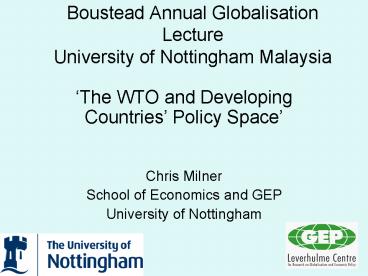Boustead Annual Globalisation Lecture University of Nottingham Malaysia - PowerPoint PPT Presentation
1 / 20
Title:
Boustead Annual Globalisation Lecture University of Nottingham Malaysia
Description:
Criticism that WTO constrains or may in future constrain policy options and ... trading regime restrict the de jure ability of developing nations to adopt ... – PowerPoint PPT presentation
Number of Views:48
Avg rating:3.0/5.0
Title: Boustead Annual Globalisation Lecture University of Nottingham Malaysia
1
Boustead Annual Globalisation Lecture University
of Nottingham Malaysia
- The WTO and Developing Countries Policy Space
- Chris Milner
- School of Economics and GEP
- University of Nottingham
2
The Policy Space Issue
- Criticism that WTO constrains or may in future
constrain policy options and actions of
developing countries - e.g. UNCTAD Trade and Development Report (2006),
the rules and commitments of the international
trading regime restrict the de jure ability of
developing nations to adopt national development
policy. (p167) - might view any loss of choice and constraints on
autonomy as undesirable - but, more typically an issue because presented as
restricting use of heterodox policies (e.g.
Rodrik, 2004)
3
Positive and Normative Issues
- How might the WTO constrain policy space in
developing countries? - Does (or will) the WTO constrain policy space in
developing countries? - Should WTO constrain developing countries policy
space (and by how much)?
4
Some Context
- WTO commitments affect only trade and
trade-related aspects of policy space - Actual trade policy space affected by other
institutions and agreements - unilateral (e.g. structural adjustment reforms)
- bilateral ( e.g. ACP countries and Economic
Partnership Agreements with the EU) - regional (e.g. membership of RTAs)
5
Potential WTO Influences on Policy Space
- Core rules of transparency, non-discrimination
and reciprocity - binding of tariffs and lowering of MFN tariffs
- Constraints on instruments (e.g. NTBs, export
subsidies) - Recent disciplines on new and beyond border areas
- services, TRIMs and TRIPs
6
Potential WTO Influences (continued)
- But also
- Exemptions to rules (e.g. regional integration,
preferences for developing countries) - Differentiation of rules for developing countries
(e.g. infant industries, balance of payments,
export subsidies) - Safeguards and defensive measures allowed
- Protection of national interest through dispute
settlement mechanism and negotiating framework
7
Potential WTO Influences (continued)
- WTO rules seek to protect autonomy and enhance
policy space, as well as constrain policy actions - defensive trade measures
- protection of small countries through rules and
dispute settlement - enhancing bargaining power through coalition
activity - improving export opportunities through
reciprocity and constraints on importing
countries
8
Actual WTO Impact on Policy Space
- Membership of GATT/WTO has not had a major impact
on bindings or tariffs of developing countries - Other sources of tariff and NTB reforms
(unilateral and regional) - Very limited use of industrial and export
subsidies
9
(No Transcript)
10
(No Transcript)
11
(No Transcript)
12
Actual WTO Impact(continued)
- Evidence of greater WTO influences on new members
(e.g. Saudi Arabia, China, Vietnam) - though most developing countries are already
members - and membership is not compulsory!
- Concerns about future tightening and stricter
implementation of rules - least developed countries exemptions from
tariff-cutting requirement in Doha negotiations - negotiable!
13
Policy Space and First Principles
- Possible positions
- more trade policy choice is better than less?
- WTO rules restrict heterodox options, with
harmful effects? - there are positive net benefits from restricting
the policy space?
14
More Policy Choice Is Always Better?
- Surely not recall pre-trade reform conditions
in sub-Saharan Africa - complex border taxation of imports
- extensive use of NTBs
- domestic firm entry restrictions
- implicit and indirect taxation of exports
- lack of transparency, pervasive rent-seeking,
under-utilisation of capacity, and random and
systematic distortions to resource allocation
15
Effective Protection by Sector Burundi (1984)
Source Greenaway and Milner (1990)
16
Selective SSA Information on Pre- and Post Reform
NTBs and Exchange Rate Distortions
(1) Various years, usually 1980s
(2) Various years, usually early 1990s
Source Dean (1995)
17
Restricts Heterodox Options?
- Challenge the interpretation of some of the
claims made for protection (e.g. in India) - Question whether some of the heterodox success
cases (e.g. South Korea) would still have been
successful with more orthodox policies - Doubt whether many of the least developed
countries have the human capital and
institutional capacity to implement the East
Asian model
18
Net Benefits of Restricting Trade Policy Space?
- Avoids costs of excessive protection and poor
intervention - Brings benefits of greater openness (subject to
sensible timing, sequencing, phasing and
adjustment support measures) - Enhances policy space (export market access) if
reciprocated by other countries
19
Overall Assessment and Conclusions
- WTO has not significantly affected developing
countries policy space to-date - The effects (constraints and enhancements) may
increase in future - but scope for phased or gradual affects and
differentiation within WTO rules - Many of the key pro-development issues are
outside the WTO agenda - improving governance, institutions, human capital
and infrastructure - Countries want to join the WTO club!
20
(No Transcript)































